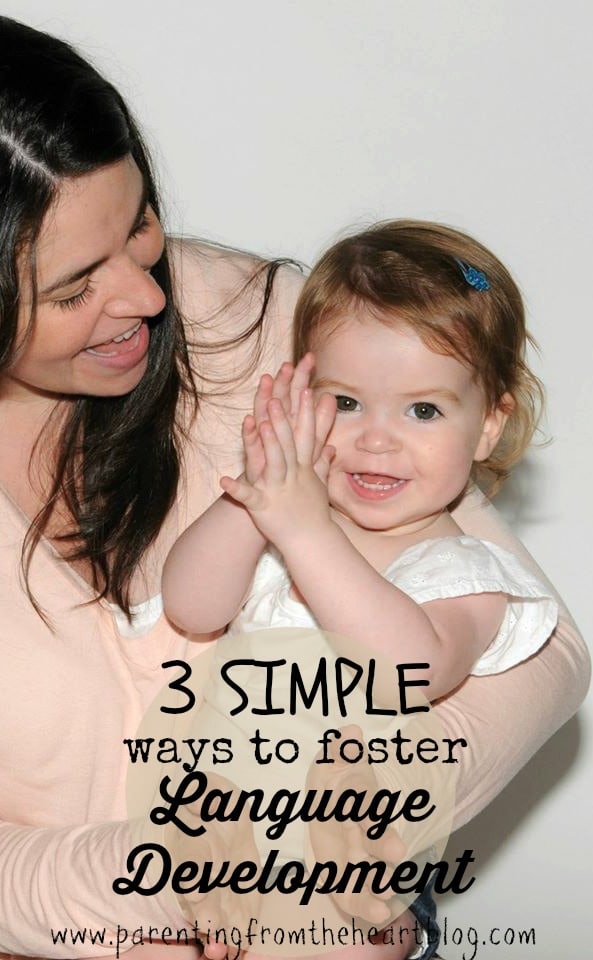Do you want to give your baby the best start linguistically? Check out these 3 research supported SIMPLE…
Do you want to give your baby the best start linguistically? Check out these 3 research supported SIMPLE ways to foster language development in infants!
My university courses on child development were undoubtedly my favourite.
Of those, the courses on language development had me fascinated!
Before taking said courses, I had no idea that language development started before birth. The fact neonates (newborns) show a preference for both their mother’s language and voice is one of the most interesting things I’ve ever learnt.
In a nutshell, research shows that “the prenatal experience with the native language gained in utero influences how the newborn brain responds to language across brain regions sensitive to speech processing” (read more here). And, auditory stimuli during the third trimester create a preference for the maternal voice once the baby is born (see more here).
From birth, the baby is a sponge for sensory experience and language is one of the many things they are paying close attention to (even if it may not be particularly apparent). By 6 months, babies have begun turning their heads to see the source of sound or conversation. They can imitate sounds (I’ll never forget my daughter’s unrelenting desire to imitate people coughing!) and are making all sorts of babbling vowel sounds. By 9 months, they are making speech-like babbles combining consonants and syllables, playing games like peekaboo and waving b-bye. It’s by this time, there is no denying infants are social little beings. And while the language development process is innate, there are so many things you can do to give your baby the best linguistic start possible. Here are 3 simple ways to foster language development in infants.

From the moment they’re born, talk often. Narrate what you’re doing, what they’re doing, how they’re feeling, what they’re attending to, what you think they’re wondering. I remember being at an early childhood program for babies and toddlers. The early childhood facilitator was asked by a mom why her almost two-year-old wasn’t talking. The facilitator was upfront, “I notice when you’re here, you don’t really talk to your daughter.” “She’s just painting and doing crafts,” the mom admitted. “Comment on the colours, the brush stroke. She can learn ‘up and down’ from what you say just on how she paints. She can learn opposites like, ‘a lot’ or ‘a little’.” The simplest activities hold boundless lessons for your child. When they’re pre-linguistic, Don’t. Stop. Talking.
This may seem a bit peculiar with a baby. But by the time they’re babbling, responding to their babbles is an invaluable way to promote language development. Ask questions and wait for a babble back. Then respond again. Research shows that caregivers responses to babies pre-linguistic babbles provide “crucial, real-time guidance to the development of prelinguistic vocalizations” (Goldstein & Schwade). Studies have found that infants who received any additional feedback from their caregivers babbled more than those that didn’t. One study found that nine-and-a-half-month-olds whose caregivers language reflected the experiences and output of the babies lead to more varied and elaborate babbling. More verbose babbling is a predictor of more advanced language development.
[Related reading: How to Promote Language Development in Toddlers]
All of these mediums are proven to lead to greater:
Read more about this here.
No matter how wonderfully rich the linguistic environment of your child is, every child develops at their own rate. Both of my kids have amazing language abilities, but my son’s first year was spent with very minimal babbling and linguistic output. Don’t beat yourself up if your child’s language output isn’t that of his or her peers. Do your best and if you feel concerned, talk to your pediatrician or family doctor.
Comforting miscarriage quotes can be a small but powerful way to help someone feel less alone. When facing…
Baby shower themes have come a long way from the days of pastel pinks and blues! These days,…
Weird signs that labor is near can sneak up on you when you least expect it. When I…